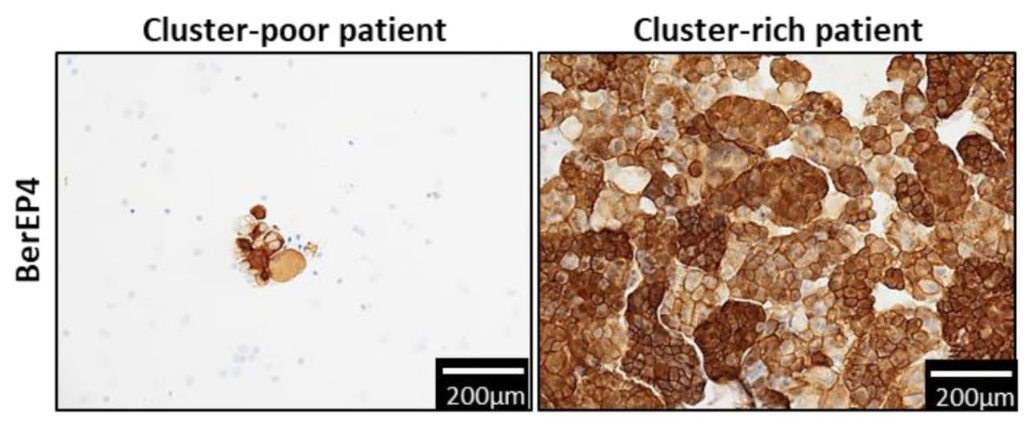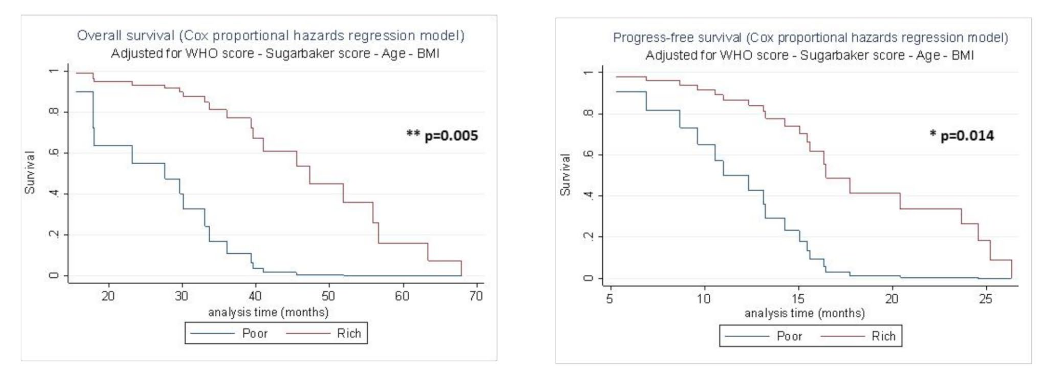Morphometric analysis of neoplastic cell clusters in high-grade serous ovarian cancer ascites identifies a promising prognostic factor: a retrospective study.
Ovarian cancer,
Ascites,
Cell clustering,
Peritoneal disease,
Prognostic factor,
Cytomorphology,
Retrospective study.
Benoît Thibault – SigDyn – Integrated cellular signalling and PI3K isoforms
Our retrospective study shows that a low number of neoplastic cell clusters in ascites is associated with shorter overall and progression-free survival in high-grade ovarian cancer.
High-grade serous carcinoma of the ovary is the most frequent intraperitoneal malignancy in women. It is associated with a poor prognostic outcome owing to the late appearance of clinical signs leading to a delayed diagnosis, and with resistance to platinum-based chemotherapy. One of the clinical signs is the development of ascites, an accumulation of inflammatory liquid in the peritoneum. The detection of neoplastic cells in ascites fluid is important as it indicates tumor progression and is associated with shorter survival. Microscopic cytospin analysis of this fluid reveals the cytological and architectural features of the neoplastic cells, allowing the pathologist to identify rapidly the malignancy and the histologic type. In association with immunocytochemistry, this process ensures a definite diagnosis and provides a specific etiology. Our objective was to provide proof-of-principle that the automatized analysis of general cytomorphological criteria, such as carcinomatous cell clustering, in malignant ascites fluid is of prognostic value in high-grade serous carcinoma. We performed a retrospective analysis of the ascites fluid of 24 advanced-stage high-grade serous ovarian cancer patients naïve of treatment. We found that the low number of neoplastic cell clusters in fluid was significantly associated with shorter overall and progression-free survival after adjusting for WHO performance status, Sugarbaker score, age and BMI. These results were independent of the peritoneal implantation of neoplastic cells. We believe this is a promising strategy to improve high-grade serous carcinoma diagnostics using a more informative but simple analysis of ascites tumor cell morphology.

Figure A: There are two categories of ovarian cancer bearing patients depending on their number of cell clusters in the ascites: cluster-poor and cluster-rich patients. BerEP4 = epithelial cell marker, corresponding to the tumor cells in the ascites.
Discover the published article
J Ovarian Res. 2025 Apr 8;18(1):74.doi: 10.1186/s13048-025-01653-y.
Morphometric analysis of neoplastic cell clusters in high-grade serous ovarian cancer ascites identifies a promising prognostic factor: a retrospective study
Benoît Thibault, Romina D’Angelo, Samy Rigal, Mélanie White-Koning, Guillaume Bataillon, Julie Guillermet-Guibert, Céline Basset
Collaborations and partnerships
JGG’s laboratory is part of Toucan, Laboratoire d’Excellence, ANR, an integrated research program on Signal-targeted Drug Resistance. JGG’s laboratory for this topic was funded by Toucan ANR Laboratory of Excellence, Fondation Claudius Regaud– IUCT-O, Translational Research@IUCT-O. We are grateful to SigDYN members, past and present, including C. Lenaoures, for their technical support, sample banks, common tools, and fruitful discussions. We thank Prof. Anne Brouchet-Gomez and the IUCT clinicians and patients who provided samples to the CRB biobank. We thank Samira Icher, project manager and Philippe Schapiro, cytotechnologist for their participation to the pathological analysis of the cases. We thank the Imag’IN platform of CHU Toulouse (https://www.ima gin- labs.net/ imagin_v2/) for providing access to whole slide scanning and image analysis facilities.

Toulouse Cancer Research Center (Oncopole)
Toulouse - FR
Follow us on social network
Contact us
+33 5 82 74 15 75
Want to join
the CRCT team ?




